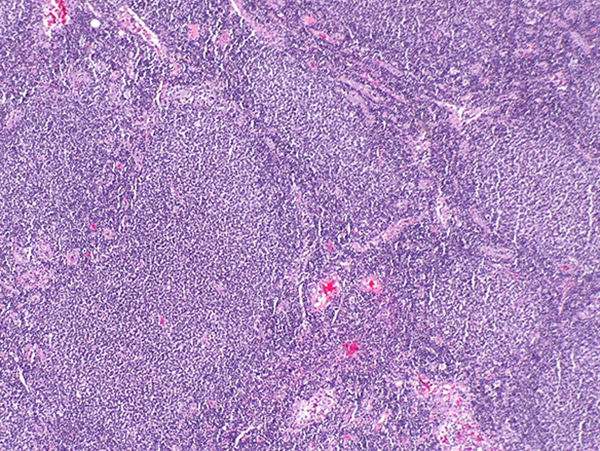A Bispecific Antibody for Follicular Lymphoma
The FDA granted accelerated approval to mosunetuzumab-axgb, the first bispecific antibody approved to treat a form of non-Hodgkin lymphoma.
The U.S. Food and Drug Administration (FDA) has granted accelerated approval to mosunetuzumab-axgb (Lunsumio) for the treatment of adult patients with follicular lymphoma whose disease relapsed following or did not respond to two or more lines of systemic therapy.
Mosunetuzumab-axgb is a type of treatment called a bispecific antibody—a construct consisting of two antibodies that bind to different cell types. Mosunetuzumab-axgb simultaneously targets CD20, found on follicular lymphoma cells, and CD3, found on T cells. The construct brings the two cell types together and helps activate the T cells to fight the cancer.

The approval was based on results from GO29781, a phase I/II, open-label, multicenter, multi-cohort clinical trial in which 90 patients with relapsed or refractory follicular lymphoma were treated with mosunetuzumab-axgb. All patients had received at least two prior lines of therapy, including a monoclonal antibody targeting CD20 and an alkylating agent.
The overall response rate was 80 percent, and the complete response rate was 60 percent. The estimated median duration of response was 22.8 months after a median follow-up of 14.9 months.
The accelerated approval came with a boxed warning for cytokine release syndrome.
Follicular lymphoma is a type of non-Hodgkin lymphoma, a cancer of the immune system. In the U.S., follicular lymphoma accounts for around 30-35 percent of non-Hodgkin lymphoma cases.
According to federal statistics, over 80,000 people in the U.S. were estimated to be diagnosed with non-Hodgkin lymphoma, and over 20,000 patients were estimated to die of the disease in 2022.
The FDA rendered its decision on December 22, 2022. Accelerated approval means that continued approval may be contingent upon a confirmatory trial.